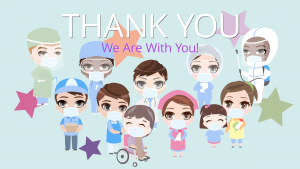April 5, 2021 ● 5 min read
By Grace Burud, Rebecca Dasema, and Nicole Short

Impact of COVID-19 for Healthcare Workers
During the pandemic, health care workers have coped with numerous stressors, ranging from worry about their patients, themselves, and their family, to moral injury when they could not provide each patient the care they wanted to, traumatization when they lost patients, increased workload as colleagues exited the workforce, and reduced ability to use their normal, healthy coping tools such as socializing. Indeed, a systematic review found up to 70% of health care workers reported clinically significant anxiety, depression, and stress during the pandemic.
Is There Such a Thing as “After the Pandemic” for Healthcare Workers?
Early in the pandemic, the public rallied behind healthcare workers, cheering them on and offering support. As the pandemic waged on, however, this public support and visibility decreased, while the demands and stress from the pandemic did not. Further, many health care workers felt betrayed when they were faced with the burden of taking care of COVID-19 patients while some members of the public carried on life as usual, seemingly without much thought to the pandemic. Now that many in the public, and even perhaps those in health care leadership, are ready to “move on” and “get back to normal,” many health care workers may feel a sense of being let down by their communities, or even that their struggles are being denied. Unfortunately, even though COVID-19 may eventually become under control with the help of vaccines, the trauma burden that many health care workers face may not automatically dissipate.
What Can You Do?
Fortunately, there are many steps health care workers, their loved ones, and their health care systems can do to mitigate these effects and help them transition to this new season successfully.
- Acknowledge the impact. At an individual and collective level, it is imperative for us to acknowledge the impact that COVID-19 and related stress have had on health care workers. At a personal level, it is important to acknowledge that it is okay to feel some distress or mixed feelings about the current situation, and not try to suppress those feelings. It is normal to continue feeling stress even as the situation is improving, and trying to push down that distress will only make it come back stronger.
- This is critical for health care systems to do for their employees, and to offer related resources as needed.
- Understand that not everyone will “get it.” It can feel like gaslighting when other people deny the impact of COVID-19, or wonder why we don’t just “move on.” Unfortunately, these interactions can be quite stressful and invalidating. Work on identifying who in your circle you can trust to talk about these issues with, and keep in mind that just because one person has a negative response, it does not mean your feelings are not valid, or that no one will understand. It’s tough, but try to keep reaching out.
- Know you are not alone. As we discussed, the majority of health care workers experienced some increase in distress during the pandemic. Feeling these negative emotions does not mean something is “wrong” with you – it just means you are human!
- Communicate and lean on your support system. Communicate with your coworkers, supervisors, and employees about job stress, and be aware of how to access mental health resources in your workplace.
- Engage in activities you enjoy. Spend time with your family, in the outdoors, exercising, and doing anything else you enjoy. Although it can be tempting to spend days off relaxing and “vegging out,” this can unfortunately continue the cycle of feeling stressed and depressed. Of course, it’s okay to have relaxation days sometimes, but balance is needed!
- Prioritize self-care. During the pandemic, health care workers may have had no choice but to soldier on, working difficult hours, pushing through their fatigue and distress, in service of their community. Some might be so used to this heightened state of stress that it feels impossible or even uncomfortable to relax. However, at this point, it is essential to prioritize self-care. Think about the safety speech flight attendants give on an airplane – you need to put on your oxygen mask before helping others. Please take advantage of vacation days and time off. Acknowledge your limits, and slow down and rest when you need it. If you’ve tried to take care of yourself but need more help, it is okay to ask for it, whether that includes informal supports from family, friends, or peers, or seeking more formal support from a counselor, therapist, or physician.
In closing, we want to reiterate that health care workers have borne the brunt of this pandemic, and have been through so much. We understand that this transition back to “normal life” might feel difficult, and might be particularly jarring when others are so eager to return to “normal.” Your feelings are valid and important, and we hope the tools above will be helpful in recovering from the stresses of the pandemic. We also encourage you to browse through the resources on our page if you feel you need more in-depth tips. Please also consider downloading and using the Heroes Health app and/or following us on Twitter (@heroes_health) for daily encouragement, discount offers, and resources.

